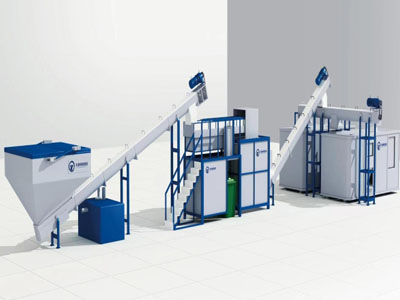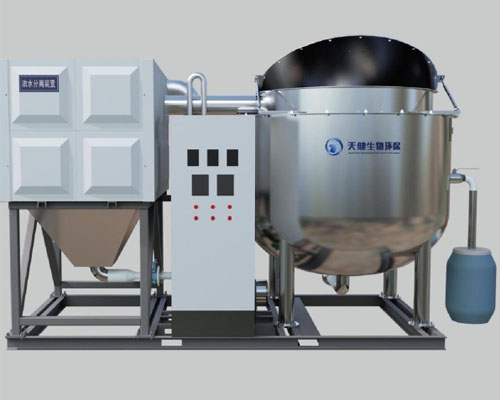Get Support
123-456-789-10
How to Choose Right Restaurant Garbage Treatment Equipment?
Managing waste in a restaurant is a critical aspect of maintaining cleanliness, complying with regulations, and ensuring smooth operations. Choosing the right garbage treatment equipment can significantly impact efficiency, hygiene, and environmental sustainability. This guide will help you make an informed decision tailored to your restaurant's specific needs.
Understand Your Waste Management Needs
Before investing in any equipment, it is essential to analyze your restaurant's garbage management requirements. Evaluate the volume of waste generated daily, the types of waste (organic, recyclable, non-recyclable), and your local waste disposal regulations. For example, high-volume restaurants may require industrial-sized compactors, while smaller establishments could benefit from versatile and space-saving units.
Explore Different Types of Garbage Treatment Equipment
There are several types of garbage treatment equipment available for restaurants, each serving specific purposes:
Food Waste Digesters: These machines break down organic waste into water or compost using microbial processes, making them ideal for reducing food waste volume sustainably.
Trash Compactors: These units compress waste to minimize space requirements, perfect for restaurants with limited storage.
Recycling Bins and Sorting Systems: Encouraging waste separation can streamline recycling processes and reduce landfill contributions.
Grease Traps: Essential for managing kitchen grease and preventing plumbing issues caused by fat buildup.
Consider Energy Efficiency and Sustainability
Sustainability is an increasingly important factor in the restaurant industry. Look for equipment with energy-efficient features or those designed to minimize environmental impact. For example, opt for food waste digesters that convert waste into compost or water, and compactors that consume less energy during operation. Equipment with certifications like ENERGY STAR is an excellent choice for reducing energy bills and supporting sustainability goals.

Large Scale Kitchen Waste Treatment Equipment
Evaluate Size and Space Requirements
The size of your kitchen and waste disposal area will influence your choice of equipment. Compact units are ideal for smaller spaces, while larger restaurants with dedicated waste management areas can accommodate bulkier machines. Ensure the selected equipment integrates seamlessly into your workflow without causing obstructions.
Check for Compliance with Local Regulations
Different regions have specific waste management and disposal regulations. Ensure the garbage treatment equipment you choose complies with local laws, such as food waste segregation rules, recycling mandates, and grease disposal requirements. Non-compliance can result in fines and reputational damage.
Assess Maintenance and Operational Costs
Investing in garbage treatment equipment involves upfront costs, but ongoing maintenance and operational expenses also need consideration. Opt for machines that are easy to clean, require minimal servicing, and have a reputation for durability. Additionally, consider the availability of replacement parts and customer support from the manufacturer.
Seek Recommendations and Reviews
Researching customer reviews and seeking recommendations from industry peers can provide valuable insights. Learn from others’ experiences to identify equipment that offers reliability, efficiency, and excellent customer support. Online platforms, trade shows, and professional networks are great sources of information.

Kitchen Waste Pre -Treatment Oil and Water Separation Equipment
Questions and Answers
Q: How do I determine the right size of garbage treatment equipment for my restaurant?
A: Evaluate your restaurant's waste generation volume and available space. Compact units are suitable for small kitchens, while larger facilities may benefit from industrial-scale equipment.
Q: Can garbage treatment equipment help reduce costs?
A: Yes, equipment like compactors and food waste digesters can lower disposal fees and reduce the frequency of waste pickups, resulting in cost savings over time.
Q: Is it necessary to separate waste before using treatment equipment?
A: Yes, separating waste into categories like organic, recyclable, and non-recyclable ensures optimal performance of the equipment and compliance with regulations.
Q: What is the lifespan of garbage treatment equipment?
A: The lifespan varies depending on the equipment type and brand. High-quality machines can last 5-10 years or more with proper maintenance.
Q: Are there any government incentives for sustainable waste management?
A: Many governments offer incentives, grants, or tax benefits for businesses adopting eco-friendly waste management solutions. Check local programs for opportunities.
By carefully assessing your restaurant’s needs and considering the factors outlined above, you can select the right garbage treatment equipment to streamline operations, enhance sustainability, and comply with regulations. Investing in the right solution will ultimately contribute to a cleaner and more efficient restaurant environment.
Do you want to receive more information about kitchen waste treatment equipment? Then we are happy to answer your questions. Fill in the contact form or send an email to https://www.tianjianepglobal.com.

 By: TianJian
By: TianJian